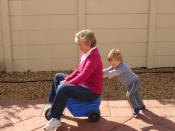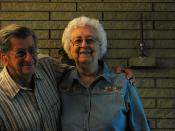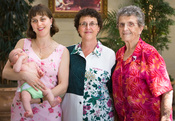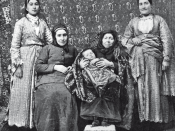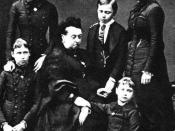Written by authorJoyce Maynard, the essay, "Honoring Mothers: Four Generations", begins with a description of the relationship between mother and daughter. The first few lines illustrate how a daughter, typically, would grow up to be much like her mother. ("The kind of mother I am is all wrapped up with the kind of mother I had."). In the first paragraph, the author explains how mothers pass on certain traits to their daughters, whether deliberately or unconsciously. These traits are then carried on for generations. This idea is apparent in the lines, "I'll hear myself saying to my children the very words that were once said to me. (Of cookies on a plate: "What you touch you take." Or, to a child wailing over being sent to bed: "That just shows me you're overtired.") Some of those lines go back a generation or two before me, and probably one or two will survive through my children in the twenty first century."In
the second paragraph, the author relates her own experiences with her mother. She recalls her adolescence, and the way her mother had brought her up. ("My mother raised me to be a mother, and (though I'm always quick to say not "when you have children," but only "if") the truth is I am probably passing on a good deal of the same pattern to my children too." The notion of patterns being "hard to break" is also evident in these lines. After she muses over her youth and upbringing, the author begins the story of what was to become a momentous episode in her life. The lines, "Audrey had just turned one. I was twenty five, my mother, fifty seven, my grandmother, eighty six. One day there were four generations. The next day there were only three," foreshadows the beginning of a great misfortune.
In paragraphs three and four, the author begins the tale of a tragedy that her family was about to face. She narrates how her mother had informed her that her grandmother was dying. The lines, "She had refused an operation that would postpone, but not prevent her death from pancreatic cancer. She could no longer eat, she had been hemorrhaging, and she had severe jaundice," informs the audience of the condition of her grandmother. The relationship between mother and daughter changes in the fourth paragraph. This is shown in the line, "My mother, telling me of this news, began to cry. So I became the mother for a moment, reminding her, reasonably, that my grandmother was eighty six, she'd had a full life."In paragraphs five to seven, the author paints the story of her grandmother, Rona, and her grandfather, Boris's youth and love.
In paragraphs eight to ten, the author narrates the story of her own mother's childhood.
Paragraph eleven describes the big transition in the life of the author's grandmother, Rona. The line, "After he [my grandfather] had died, my grandmother's life was lived, more than ever, through her children, and her pride, her possessiveness, seemed suffocating," describes immensity of the change that occurred.
Paragraph fourteen zooms back to reality, where the author relates how she and her one year old daughter travel to Winnipeg to visit her grandmother for what she guessed would be the last time. She recalled the way her mother had groomed and dressed her, when she was a little girl, and how she now did the same to her own daughter. ("I put Audrey's best dress on, the way the best dresses were always put on me for visits twenty years before,").
After the visit to her grandmother, the author broods over relationships between mothers and daughters. ("On the plane flying home with Audrey I my arms, I thought about mothers and daughters, and the four generations of the family that I know most intimately,"). She reflects on the way her grandmother loved her mother, how her mother loved her, and the very way that she loved her own daughter.
The structure of the essay can be very confusing. This is because the author kept recalling past events, and then switching back to present events. Though this technique may be effective, many times it is also very difficult to understand. A kind of evocative tone takes over the essay. This is evident whenever she recalls events of the past.
The essay illustrates the picture of the unconditional love that our mothers give to us. Though we may not understand this love when we are young, a time will come in our lives, when we, ourselves, will give this unconditional love.
Sources:www.joycemaynard.com/.../parenting-hm-four-generations.shtml
